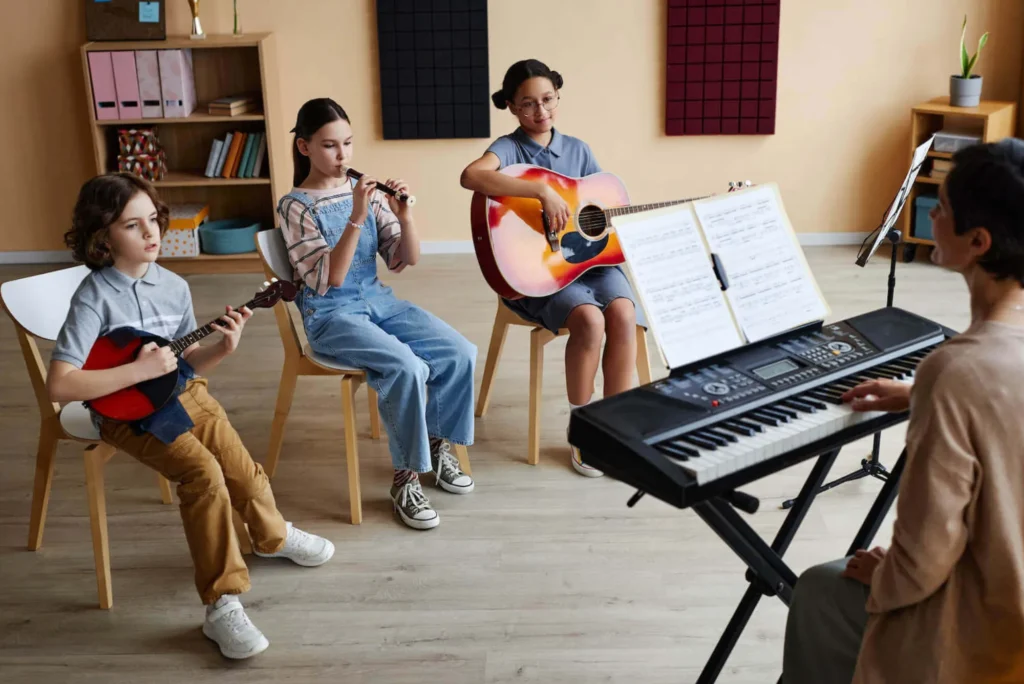Music schools play a crucial role in nurturing talent, fostering creativity, and equipping students with the skills needed for a lifelong love of music or a successful career. This guide explores the types of music schools, their benefits, and how to choose the best one for your goals.
Types of Music Schools
Conservatories
Conservatories focus on high-level training in music performance, theory, and composition. They cater to aspiring professional musicians, often offering bachelor’s, master’s, or diploma programs. Examples include prestigious institutions like Juilliard and Berklee College of Music.
Community Music Schools
Community music schools provide accessible music education for all age groups. They often offer flexible schedules, affordable tuition, and a variety of classes, from beginner lessons to advanced workshops.
Private Music Academies
Private music academies specialize in personalized instruction, catering to students seeking focused training in specific instruments or styles. These schools often provide one-on-one lessons and smaller class sizes.
Choosing the Right Music School
Factors to Consider

Finding the right music school requires evaluating your goals and priorities. Here are some key factors to consider:
Programs Offered: Ensure the school provides instruction in your preferred instrument, genre, or style.
Faculty Expertise: Research the instructors’ qualifications and professional backgrounds.
Facilities and Resources: Look for well-equipped practice spaces, performance venues, and access to instruments.
Cost and Scholarships: Determine whether tuition fits your budget and explore financial aid opportunities.
Research Tips
Visit the school’s website to review their curriculum, mission, and testimonials.
Attend open houses or concerts to experience the school’s atmosphere.
Connect with current students or alumni for insights into their experiences.
Benefits of Music Education
Cognitive Development
Learning music has been shown to enhance memory, problem-solving skills, and overall brain function. Studies suggest that students who engage in music education often excel academically.
Emotional and Social Growth
Music fosters creativity, discipline, and self-expression. Collaborative activities like ensemble performances teach teamwork and improve communication skills.
Lifelong Enjoyment
Whether you’re pursuing music as a hobby or a career, the skills you develop at a music school will enrich your life and provide a lasting source of joy.
Top Music Schools by Region

Highlighting Music Schools Near You
Many regions have excellent music schools catering to different needs. Here are examples of what to look for:
Harmony Music Academy: Known for its beginner-friendly programs and diverse instrument classes.
Crescendo Conservatory: Specializes in advanced training for classical music.
Rhythm Beats Academy: Focuses on contemporary music genres like jazz, rock, and electronic.
By researching local options, you can find a school that aligns with your interests and aspirations.
Learning Instruments and Styles
Popular Instruments
Music schools often offer lessons in a variety of instruments, including:
Piano: A versatile instrument ideal for beginners and advanced students alike.
Guitar: Perfect for those interested in rock, pop, or classical styles.
Violin: A staple in classical music and orchestral settings.
Drums: Great for rhythm enthusiasts and those drawn to energetic performances.
Exploring Genres
Students can explore genres ranging from classical and jazz to modern pop, EDM, and traditional folk music. Many schools encourage experimentation to help students find their unique voice.
Career Paths in Music
Professional Opportunities
Music schools prepare students for diverse careers, such as:
Performers: Soloists, band members, or orchestral musicians.
Educators: Private instructors or school music teachers.
Producers: Composers and sound engineers working in the music industry.
Preparing for Success
A good music school provides not only technical training but also opportunities for networking, mentorship, and real-world experience through recitals, internships, and collaborations.
Choosing the right music school is a significant step toward achieving your musical goals. Whether you’re looking for casual lessons, advanced training, or a community of like-minded musicians, there’s a music school tailored to your needs.
Start your journey today and discover the joy, growth, and opportunities that music education can bring!



